Estimated Read Time: 5 Minutes
You are a small business owner who has been trying to optimize your website for a while now. You want to know whether you’re making progress. Rather than just trust your gut, are there any objective measures you can use to assess your website power and influence?
The answer is yes, there is a 3rd-party option available – Moz Domain Authority.
Domain Authority
Domain authority (DA) is a search engine ranking score developed by Moz, a search engine optimization (SEO) tool maker, research organization, educator and though-leader. Domain authority is intended to predict how well a website (domain) will perform in search results compared to other (competing) sites. Domain authority is updated continuously with scores ranging from 1 to 100, the higher the score, the greater your ranking potential.
Domain authority is based on a logarithmic scale. That means every time your score improves, it’s going to be exponentially harder to achieve that same progress again. In other words, it’s a whole lot harder to bump your score from 60 to 61 than it is to go from 0 to 1 or 1 to 10. Think of it like you would climbing Mount Everest. The trip to base camp I (18,300′) is infinitely easier to accomplish than the last few feet to the summit (29,009′).
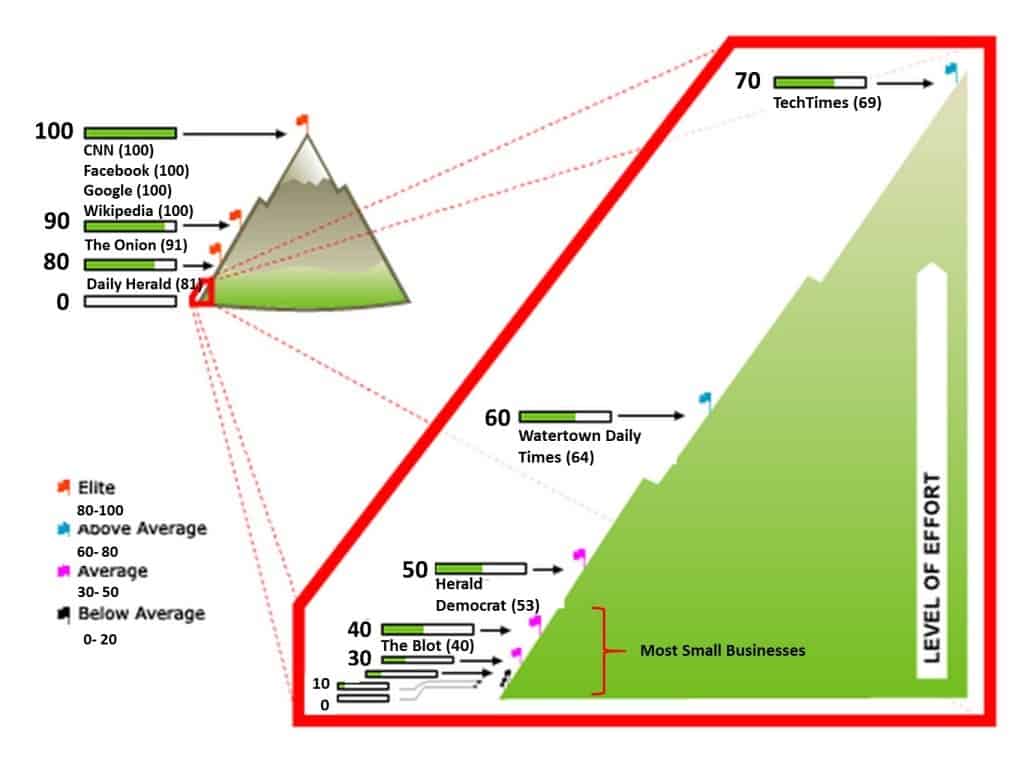
Domain Authority, adapted from the 2008 Elliance Page Rank Explained infographic
It is important to note that not every website is going to achieve a domain authority of 100. In fact, very few do. Google has a domain authority of 100. Facebook has a domain authority of 96, Amazon as well. A domain authority between 40 and 50 is considered average, between 50 and 60 is good, and over 60 is considered excellent. Small businesses are incredibly diverse. They can have a domain authority of anywhere between 1 and 60.
Sample Scores
To give you a flavor for some domain authority scores, I sampled some national and local sites. Here are the results.
- Google (100)
- Wikipedia (98)
- Linkedin (98)
- Facebook (96)
- Amazon (96)
- Xfinity (92)
- Verizon (90)
- Wawa (62)
- West Philadelphia High School (56)
- Acme Markets (54)
- Peco (52)
- B-SeenOnTop (37)
Your Score
There are a couple of different ways you can determine your website’s domain authority.
The first is using the Moz Free Domain SEO Metrics tool.
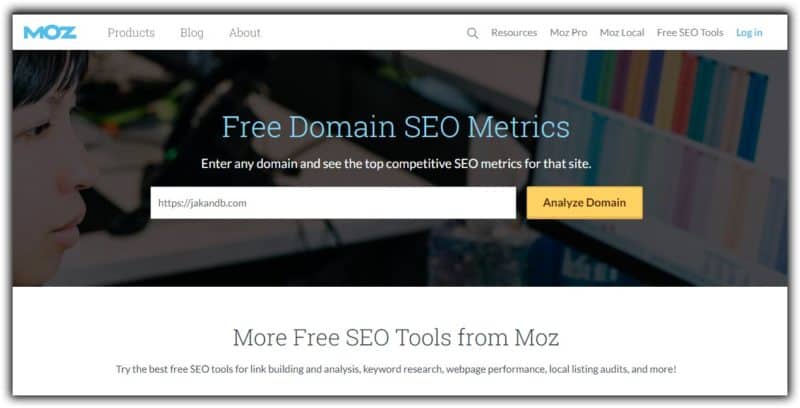
Simply type in your domain name and view results.
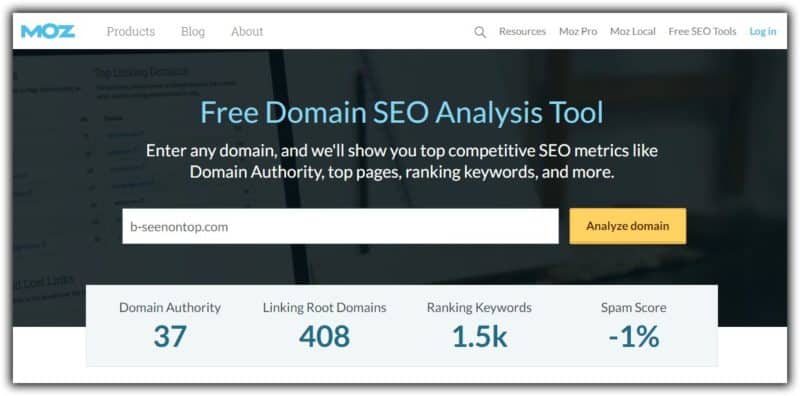
The other option is to download and use the free Moz toolbar, available for Chrome and Firefox. After you install the toolbar, website domain (and page) authority will be displayed below search results and at the top (or bottom) of pages displayed with your browser.
Here’s an example of what you’ll see in search results.
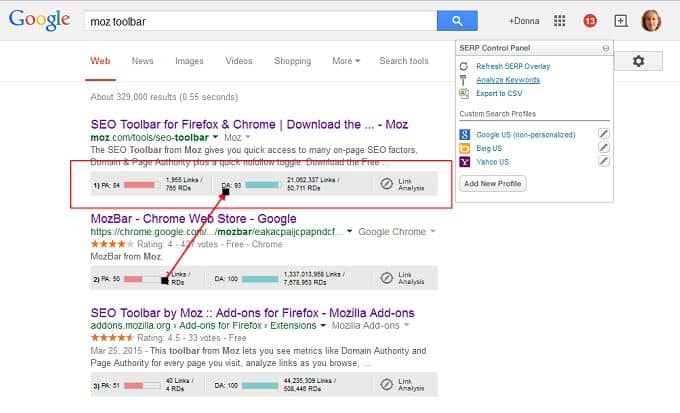
The domain authority of Moz was 93 when this snapshot was taken.
High-level website metrics like page authority (PA)*, domain authority (DA), and the number of incoming links and linking root domains (RDs) are shown below individual search results. You have to subscribe to Moz to see the actual link and root domain (RD) counts. If you’re not a subscriber, it will display “PRO ONLY” instead.
This is what you see when you have the toolbar installed and visit a web page. This example is for the Moz toolbar page itself.
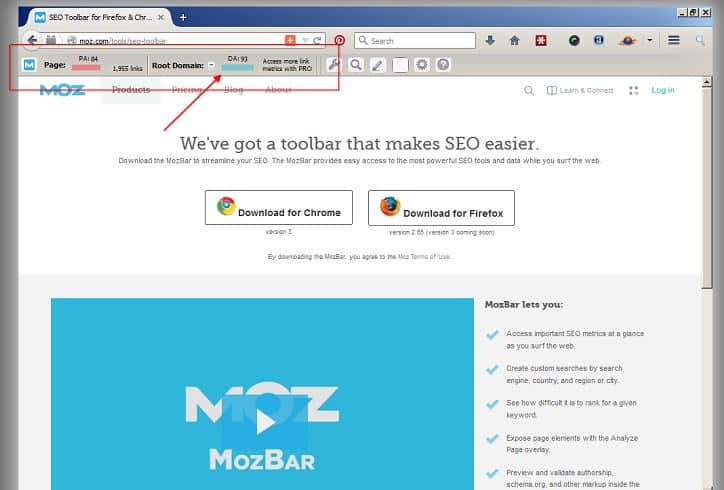
How To Use (and Not Use) Scores
So now you have the scores, how should you use them?
As a Comparative Metric
Domain authority’s true value is as a comparative metric – meaning it is useful to see how Moz interprets your ranking potential relative to the competition. If I want to rank for “philadelphia seo company”, for example, it’s helpful to look at the page and domain authority of the top 10 ranking pages in search results before deciding that is the search phrase I actually want to optimize for. Remember SEO is highly competitive. A different search phrase may have a lower bar when it comes to making it the first page of search results.
Domain authority is a good metric to baseline when you are starting your SEO journey. Baseline your, and your top competitors’ domain authority scores before you begin optimization. It’s your starting point, your line in the sand from which you can measure improvement over time. If your competitors are leagues ahead of you in terms of DA, don’t aim to achieve the same or a similar score as them or you’ll just get frustrated. Instead, try to decrease the difference between your two scores. That’s more realistic and attainable.
Don’t use domain authority as your only measure of optimization success. DA is but one metric. Remember the goal of SEO is to help you achieve your business objectives. Instead of using DA by itself, work with your SEO company to come with a short-list of key performance indicators that will measure whether you are making progress toward your business objectives, things like search impressions, traffic, conversions, time on page and site, backlinks, and reviews.
To Measure Treads
Because domain authority has its shortcomings and tends to fluctuate over time, it’s best to look for trends and not obsess over short-term fluctuations. If you’re doing what you need to, you should see a slow and gradual improvement in your site’s Domain Authority scores over time. Remember that the rate of improvement will slow as you gain authority given the logarithmic nature of the metric – it gets harder as you “climb the mountain”.
Keep Perspective
There are other third-party tools that produce similar metrics to Moz. These include Ahrefs, Majestic SEO, SEMRush, and more. Moz was the first so it has brand name recognition and it has earned an excellent reputation. So much so, in fact, some people believe domain authority influences on your ranking potential. That is NOT true. Google does not use domain authority in its ranking algorithms. It is a third-party predictive metric, that is all.
Domain authority does have some influence when you’re trying to optimize your website and its content though. It can influence other website owner’s decisions about whether they want to link to you or not.
So what do you think? Do you think any of these scores be able to help you? Do they make sense? Do you prefer others? Let me know in the comments below and I’ll get right back to you.
IMAGE CREDIT: Featured image by Cojharries (Own work) (CC BY-SA 3.0 or GFDL), via Wikimedia Commons
*Page Authority is another metric produced by Moz. Like domain authority, it predicts ranking potential but for a specific page versus domain.





Leave A Comment